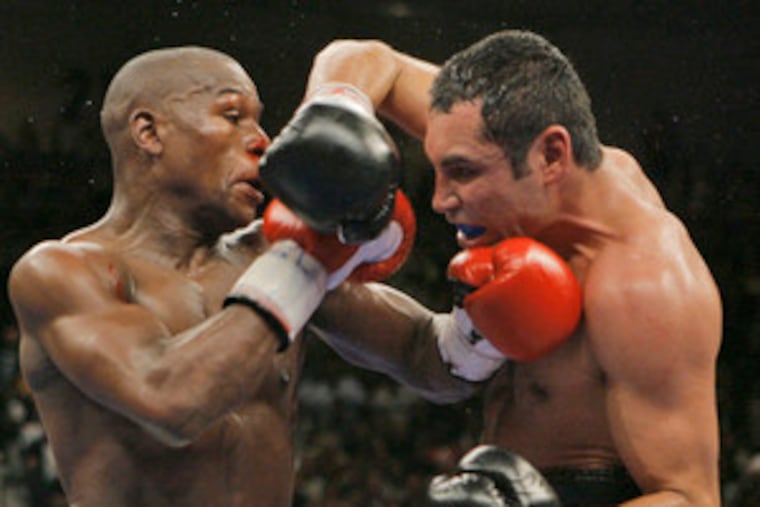Stephen A. Smith | Bout to renew boxing fails to deliver
LAS VEGAS - If this was supposed to be the fight that saved the sport, that resurrected the once-insatiable pugilistic appetite that has been dormant for years, boxing is in bigger trouble than any of us could have imagined.

LAS VEGAS - If this was supposed to be the fight that saved the sport, that resurrected the once-insatiable pugilistic appetite that has been dormant for years, boxing is in bigger trouble than any of us could have imagined.
Floyd Mayweather Jr. won the World Boxing Council junior-middleweight championship Saturday night at the MGM Grand. He won it because he was faster, slicker and smarter than the man billed as the sport's biggest non-heavyweight attraction. And for those who are fine with that, fine with Oscar De La Hoya as your "Golden Boy" despite losses in three of his last five fights, consider yourself senseless. Or just smitten with the man's charm and good looks.
Relying on mediocrity wouldn't be the worst thing for boxing if it were just an occasional occurrence instead of something that has contaminated the sport for years. The harsh reality is that boxing relegated itself to a niche sport years ago, primarily because of its own sleaze and greed, and Mayweather's split-decision victory over De La Hoya did little to halt its slide toward irrelevance, despite hype that promised otherwise.
Don't blame Mayweather, though. He did his part and then some. He was the smaller fighter moving up in weight, lacking sensational knockout power, but still providing moments of toe-to-toe encounters that hinted toward something dramatic. The fact that De La Hoya connected on just 21 percent of the 587 punches he threw, relying on volume and rabid fan support to try to sway the judges, was not Mayweather's problem. That was De La Hoya's only recourse.
After spending months taunting and insulting De La Hoya, guaranteeing victory along the way, Mayweather (who connected on 43 percent of his punches, by the way) further exacerbated the enemy's contingent by entering the ring draped in Mexican garb from head to toe, including a sombrero he put on backward. Question his class all you want, but his promotional skills rivaled those of noted promoters Don King and Bob Arum, and certainly eclipsed anything that Golden Boy Promotions threw at the viewing public for this fight.
The pro De La Hoya crowd resembled vultures at a gladiator match, serenading insults while calling for Mayweather's backside, with Mayweather playing the villain's role to the hilt. Unfortunately, the fight messed everything up, mainly because Mayweather's skills made it anticlimactic, forcing everyone to wonder where boxing is going now.
There's a reason we still talk about the Thrilla in Manila more than 30 years since it took place. Back then, we had George Foreman, Earnie Shavers, Ron Lyle, Ken Norton and Jimmy Young to lump in with the likes of Muhammad Ali vs. Joe Frazier in the heavyweight division. In the 1980s, there were Sugar Ray Leonard, Roberto Duran and Tommy "Hit Man" Hearns at welterweight, with "Marvelous" Marvin Hagler patrolling the middleweight division.
There was some comedy, with Aaron Pryor's cornerman asking for "the stuff" when he beat up the great Alexis Arguello at 140 pounds. Ray "Boom Boom" Mancini served as one of America's Rocky-like heartthrobs. Salvador Sanchez, at 130 pounds, was considered the best in the world before his sudden death. There was Julio Cesar Chavez on a great run, and Mike Tyson was about to start being "the baddest man on the planet" for entirely different reasons than we've come to know.
Punches made you squirm back then. Missed punches made you cringe. There was no patience for timid fighters. Every moment was a time when you knew who the champions were by their body of work - or Howard Cosell was telling you about them on ABC's Wide World of Sports.
Those were the good old days. Now, we hear the 30-year-old Mayweather saying, "I want to get the sport back to where it was," before promptly retiring Saturday night after his victory, knowing he was lying, which brings us back to boxing's regressive state of affairs.
After the split decision was announced, De La Hoya, 34, had the nerve to say, "I thought I won the fight. I was the constant aggressor. I thought you had to take the title from the champion. I brought it to [Mayweather]. Had I not done that, there would not have been a fight."
This is the way it has worked in boxing for years, with boxers displaying duplicitous ways that would rival those of most lawyers. That's probably why Ultimate Fighting is selling out arenas in Las Vegas these days.
"We put on a great fight," Mayweather said after his victory. "Boxing is here to stay. We gave people their money's worth. What more can we say?"
Not much. At least not until some better-than-decent fights come along.
A good rivalry wouldn't hurt, either.